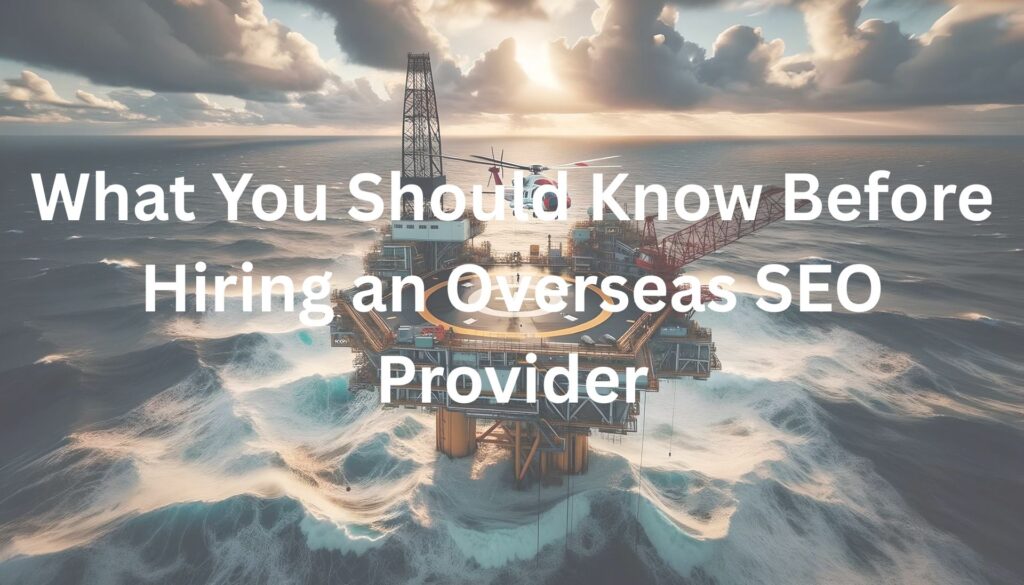Hiring an overseas SEO provider can feel like stepping onto a global chessboard—full of opportunity, but with risks if you don’t play your moves right.
In a hyperconnected world where businesses operate across time zones, languages, and currencies, outsourcing SEO abroad seems like a smart, cost-efficient strategy. And it can be. But here’s the reality most businesses learn the hard way: just because someone claims they can boost your rankings doesn’t mean they understand your market, your audience, or even your language nuances.
This blog isn’t here to scare you. It’s here to equip you.
Whether you’re a startup founder watching your ad budget bleed dry or an established brand ready to scale globally, hiring the right overseas SEO partner can unlock massive growth. But hiring the wrong one? That could mean traffic losses, algorithmic penalties, and a long road to rebuild your digital credibility.
Before you wire the deposit or sign the dotted line, you need to know what you’re getting into—and what to watch for. Let’s break it down.
Why Businesses Consider Overseas SEO Providers
1. Cost-Effectiveness
Let’s not pretend price isn’t a motivator. Hiring SEO talent overseas often means accessing the same skill sets at a fraction of domestic costs. A solid agency or freelancer from Southeast Asia or Eastern Europe can deliver results at one-third the cost of a U.S. or U.K.-based counterpart. For small businesses and startups especially, that cost difference is not just appealing—it’s survival math.
But there’s a catch: cheaper doesn’t always mean better. What you’re saving in dollars, you might be paying for in oversight, poor communication, or rework. Knowing what to expect helps you distinguish value from just a low price tag.
2. Access to Global Talent
The best SEO minds aren’t confined to one country. In fact, many top-performing SEO professionals operate remotely, managing campaigns across industries and geographies. Tapping into overseas markets expands your hiring pool to experts who’ve optimized everything from niche SaaS platforms in Germany to real estate portals in the U.S.
This access can bring in fresh perspectives, unique technical insights, and culturally rich content strategies that a local team might miss. If you’re thinking globally, global talent just makes sense.
3. 24/7 Productivity
Here’s one of the most underrated benefits: the time zone gap. While you’re sleeping, your overseas team could be working—fixing technical issues, updating content, running link audits, or publishing blogs.
This round-the-clock work cycle accelerates deliverables and often leads to faster iteration. It’s not uncommon for businesses to log in each morning to a fully optimized page, updated rankings, or fresh backlink opportunities. In competitive markets, this time advantage can mean the difference between getting there first—or falling behind.
Key Factors to Evaluate Before Hiring
1. Communication and Language Skills
No matter how technically gifted an overseas SEO provider might be, if they can’t communicate clearly—especially in your language—projects stall, details get lost, and frustrations mount.
From reporting accuracy to keyword context, language fluency plays a massive role in campaign success. Misinterpretation of tone or regional slang in copy can easily alienate your target audience.
Insist on video calls, sample reports, and content samples before committing. You’re not just hiring skills—you’re hiring clarity.
2. Cultural and Time Zone Differences
Cultural nuances can make or break how your brand is perceived. An SEO provider in a vastly different cultural context may not immediately grasp the tone, humor, or sensitivities of your target market.
Moreover, time zone misalignments can delay feedback loops or real-time collaboration—especially in fast-paced environments.
Before hiring, ask:
- Will they be available during your work hours, at least partially?
- Do they have experience working with businesses in your country or industry?
- Are they culturally flexible and eager to understand your market, not just deliver tasks?
3. Experience and Portfolio
This is where claims meet proof. Look for:
- Case studies from previous clients
- SEO audits they’ve performed
- Industries they’ve worked in
- Specific results (rankings, traffic growth, conversion impact)
A credible provider won’t just talk rankings—they’ll walk you through how they got there. Bonus points if they’ve handled challenges similar to yours: algorithm recovery, new domain launches, or multilingual SEO.
4. SEO Techniques and Practices
Ethical SEO is non-negotiable. Ask potential providers about:
- Their on-page and off-page strategies
- Link-building approach
- Technical optimization expertise
- Experience with platforms like WordPress, Shopify, or Magento
Beware of red flags:
- Promises of “guaranteed #1 rankings”
- Use of PBNs (Private Blog Networks) or link farms
- Lack of transparency on tools or tactics
You want a partner who uses sustainable strategies, not shortcuts that could get you penalized.
5. Understanding of Your Target Market
SEO is hyperlocal, even when outsourced. If your provider doesn’t understand the search habits, terminology, or preferences of your audience, their work won’t resonate—or rank.
Ask yourself:
- Can they identify local competitors and search trends?
- Do they understand your customer’s pain points and buying behavior?
- Have they handled localized content or local SEO before?
An overseas team that’s done their homework will already know what matters in your market before you brief them.
Risks of Hiring the Wrong Overseas SEO Provider
Let’s be honest: outsourcing SEO overseas can save you money and expand your reach—but only if you choose wisely. Because when it goes wrong, it doesn’t just stall your growth—it can sabotage your entire digital presence.
Here’s where things typically unravel.
1. Poor Quality Work
Anyone can claim they’re an “SEO expert” on a slick website or freelance profile. But hiring someone who lacks the actual skills, experience, or understanding of modern SEO practices can do more harm than good.
You’ll spot the signs quickly:
- Blogs riddled with fluff or poorly written English
- Backlinks from spammy, irrelevant sites
- Stuffed keywords that sound robotic
- Generic audits that tell you nothing you don’t already know
And once poor-quality SEO gets indexed? The damage sticks. Cleaning it up takes time—and often costs more than what you saved by hiring cheap in the first place.
2. Hidden Costs
That jaw-droppingly low hourly rate? It may come with strings attached. Many businesses find themselves lured in by “too-good-to-be-true” pricing, only to discover add-on charges for tools, revisions, or basic deliverables they assumed were included.
Also, unclear timelines and vague scopes of work can lead to extended project hours that weren’t originally budgeted. Suddenly, your “affordable” overseas SEO contract isn’t so affordable anymore.
Always look beneath the surface. Transparency is non-negotiable.
3. Security and Confidentiality
Your SEO partner has access to a lot—your website backend, Google Analytics, Search Console, maybe even login credentials and proprietary strategy documents. Handing that over to someone you barely know (and whose country may not uphold the same data protection laws) can be a serious business risk.
If your provider doesn’t have clear security protocols—or worse, if they outsource your project again without your knowledge—you could be exposing sensitive data to unauthorized third parties.
Always ask:
- Who will actually be working on my account?
- How is my data stored and shared?
- What’s the protocol in case of a breach?
4. SEO Penalties
The fastest way to drop off Google’s radar is to hire someone who plays fast and loose with SEO rules. From shady link-building schemes to plagiarized content and keyword stuffing, black-hat tactics might deliver a short-term ranking boost—but it won’t last.
Once search engines catch on (and they will), your site could be penalized or deindexed entirely. Recovery can take months, and in some cases, it’s easier to start from scratch.
The sad truth? Some overseas providers rely on churn-and-burn tactics. They’ll hop onto the next client long before the penalty hits.
Tips for Making the Right Choice
You’re not here to gamble. You’re here to grow. So let’s talk about how to do this right. These aren’t just “good-to-knows”—they’re non-negotiables if you want a real return on your overseas SEO investment.
1. Start Small with a Trial Project
Before you hand over your entire website or a long-term contract, test the waters. A small technical audit, blog writing sample, or local SEO task can reveal a lot about how the provider thinks, communicates, and executes.
It’s the difference between hoping someone’s legit and knowing they are.
Look for:
- How they handle instructions
- Their turnaround time
- Attention to detail
- Initiative and problem-solving
2. Use Reputable Freelance Platforms or Agencies
Avoid hiring someone from a random email or unverified source. Platforms like Upwork, Toptal, and Clutch—or established SEO agencies with verifiable portfolios—offer an added layer of security, reviews, and accountability.
Why it matters:
- You get built-in contracts and payment protection
- You can verify their history with other clients
- You’re less likely to get ghosted mid-project
Agencies may cost more upfront—but the peace of mind and structured delivery often justify the investment.
3. Set Clear Goals and Expectations
“Get me to Page 1” is not a strategy.
Before any real work begins, align on:
- Specific KPIs (organic traffic growth, leads, conversions)
- Milestones and timelines
- Reporting format and frequency
- Who handles what (content, technical fixes, backlinks)
This avoids miscommunication, scope creep, and unmet expectations down the line. Clarity now saves conflict later.
4. Use Contracts with Clear Terms
Freelancers and agencies alike should be willing to sign a contract that outlines:
- Scope of work
- Deadlines and deliverables
- Payment terms
- Confidentiality and data security
- Ownership of work
A contract isn’t about mistrust—it’s about mutual respect and accountability.
Conclusion
Let’s bring this all together.
Hiring an overseas SEO provider is not a risky roll of the dice—it’s a strategic decision. But only if approached with eyes wide open. There’s global talent out there doing phenomenal work. Teams that understand the algorithms, respect white-hat practices, and deliver results without draining your marketing budget. The trick is finding the right one—and knowing what pitfalls to dodge along the way.
Cost shouldn’t be your only driver. It’s important—but it’s not everything. If the provider doesn’t understand your market, speaks in vague promises, or avoids transparent communication, those red flags will eventually cost more than a domestic alternative ever would.
You want a partner, not just a provider. Someone who brings expertise, integrity, and initiative to the table. Someone who doesn’t just nod along on Zoom calls but challenges, recommends, and helps shape your long-term SEO strategy.
If you’re seriously considering working with an offshore SEO company, make sure it’s one that not only understands the technical side of search but also the cultural, linguistic, and business context of your audience. That’s what separates a low-cost vendor from a high-impact partner.
Remember, search visibility isn’t built overnight. And it definitely isn’t built on shortcuts.
FAQs
1. Is it safe to hire an overseas SEO provider?
Yes—but with caveats. The safety of hiring overseas depends on how carefully you vet your provider. Stick to agencies or freelancers with verified portfolios, real client feedback, and transparent processes. Look for teams that use secure communication and data-sharing tools. And always work under contract with clear confidentiality terms.
2. How can I ensure quality work from an overseas agency?
Start small. Assign a trial project, ask detailed questions, and inspect past work—particularly in your industry or region. Request sample reports, check how they handle SEO metrics, and review their on-page and off-page strategies. Quality isn’t just visible in the rankings—it’s in their thought process, responsiveness, and clarity.
3. What’s the typical cost difference?
Depending on the region, you could pay 30–70% less for comparable SEO services when working with overseas providers. For example, a U.S.-based SEO campaign that might cost $3,000/month could cost between $800 and $1,500/month offshore. But remember—if it’s too cheap, dig deeper. Some “affordable” services skip the essentials or, worse, use black-hat tactics.
4. What time zones work best for smooth communication?
It depends on your business hours. Generally, teams in Central and Eastern Europe overlap well with both Asian and Western time zones. Southeast Asia (like India or the Philippines) is ideal if you’re open to morning syncs or async workflows. The key is not the time zone but whether the team is flexible, communicative, and responsive.
5. Can overseas providers understand my local SEO needs?
Absolutely—if they’ve done their homework. Many overseas agencies specialize in international SEO and have deep experience optimizing for U.S., UK, Canadian, and Australian markets. Look for teams that research your audience, competitors, and language nuances. Ask if they’ve handled local SEO, Google Business Profile optimization, and region-specific link building.


